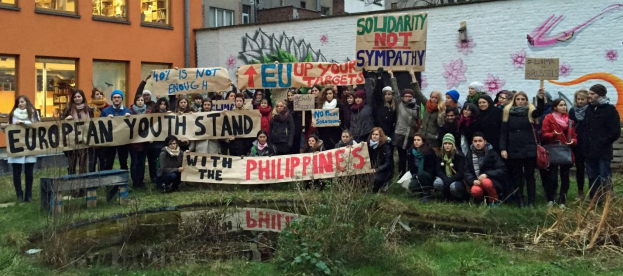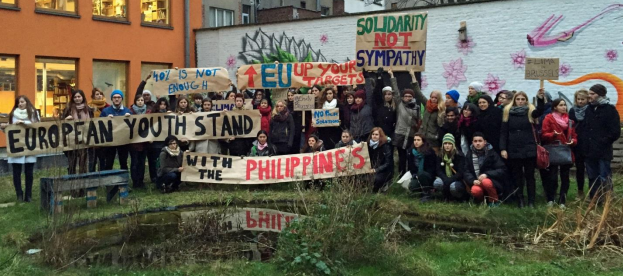Brussels, December 12 2014
Dear Mr Giovanni La Via, Mr Jo Leinen, Mr Jerzy Buzek, Mr Karl-Heinz Florenz, Ms Elisabetta Gardini, Mr Seb Dance, Ms Kathleen Van Brempt, Mr Ian D, Mr Gerben-Jan Gerbrandy, Ms Merja Kyllonen, Mr Bas Eickhout, and Mr Valentinas Mazuronis,
Over the last two weeks, citizens across Europe have looked to you to promote genuine, responsible and socially just measures to fight climate change at the UN climate talks in Lima. As 60 European youth hailing from 12 countries across the continent, we have gathered in Brussels over the last week to follow and respond to your progress.
Unfortunately, as we approach the end of this year’s negotiations, it seems as though there has been little change in the narrative of previous climate negotiation rounds – the global North and corporate interests dominate, the voices and proposals of the South and civil society are sidelined, and no meaningful progress has been made.
Corporate capture
The corporate capture of the climate talks is nakedly apparent, and the dirty energy lobby has been out in force once again. Reports linking corporations such as Anglo American, who pour money into promoting false, ‘green solutions’ to the climate crisis at the talks for their own profits – such as offset mechanisms – are just the start.
The ‘World Climate Summit’, a vauntingly-titled gathering of businesses, financiers and government representatives, kicked off on December 10th. While the European Investment Bank (EIB) Odebrecht, Alstom, and other corporations and financial backers with petrochemical, gas and other dirty energy interests sponsored the event, there was no platform given to civil society voices. In Brussels, we marked both this and a Shell-sponsored greenwashing event by protesting outside the offices of Shell and EIB, and calling for an end to their influence at the talks.
This corporate thirst for influence reached its apex on December 10, when the International Chamber of Commerce called for a greater say for business in the negotiations, saying “This issue is important for governments to address but it is far too important to leave to governments alone”. They are, of course, correct – albeit not for the reasons they argue: the issue is far, far too important to involve the private sector at all.
Power imbalances – the North dominates once again
Another striking thing about the guestlist at the World Climate Summit was almost total lack of representatives – corporate or otherwise – from the global South. Naderev Saño, a passionate advocate for genuine climate action from the Philippines whose vocal criticism of the approach of the west at previous COPs had made him into a figurehead for the developing world, was silenced this year and left at home. Political pressure from industrialised nations was suspected to have played a part.
If even government delegations from the South are struggling to make their cases on their own terms, the outlook is particularly bleak for the role of civil society voices that represent people and planet in the South.
Criminalisation of environmental defenders
This suppression of voices who criticise the status quo of the negotiations, of market-led solutions to market-created problems, and of solutions dictated by rich nations and corporations, has disturbing consequences for those who voice dissent.
Beyond being shut out of negotiations at institutionalised events like the COP, activists around the world are facing criminal charges for legitimate action taken against polluting corporations and environmentally-destructive policies. José Isidro Tendetza Antún, the leader of an indigenous group in Ecuador and a vocal critic of the Correa administration’s plans for Amazonian oil exploration, was murdered on his way to Lima. Other climate activists who had been travelling alongside him had their bus confiscated.
There is a temptation for those in the global North to think of cases like these as being confined to far-flung parts of the world, areas where there are ‘real’ struggles between state/corporate power and citizens. Yet police in Europe are by no means beyond this, as the killing of Remi Fraisse at a protest against the Sivens dam project by French police in October illustrates.
These heavy-handed dealings with environmental defenders set an ominous tone for a country hosting next year’s COP21 – at which any climate deal proposed in Lima would be agreed.
“The repression of non-violent environmentalists we’ve witnessed here in France these past months is deeply troubling. That the host of the decisive climate talks in 2015 would display this kind of brutality raises serious questions as to their willingness to act decisively on climate change and other environmental issues“, said Clémence Hutin from Young Friends of the Earth Europe.
Towards Paris – listen to the South and those who stand in solidarity with them
While there have been opportunities to open up the negotiation process to civil society – this year’s Social Pre-COP in Venezuela, for example – as the talks draw to a close it is becoming clear that events and spaces like these serve as little more than a sideshow to the main event.
Corporations and neoliberal governments around the world have already co-opted the language of environmentalism – “sustainability” has been diluted to the point of meaninglessness – and we must ensure that the same does not happen to the democratic process of climate action. We have a litany of names for the voices that represent people and planet: civil society, social groups, the global South. Yet the common thread is of non- and anti-corporate, globally Southern perspectives. Those who are financially and politically on the back foot. Those against whom the process is aligned. Those with whom we as European youth stand in solidarity with, and whose demands we echo as this COP draws to a close.
These are the voices which we, as Europeans with a historical responsibility for our destructive climate past, must listen and cede the negotiating ground to, if we are to achieve the lasting, just and equitable agreement we need in Paris next year.
Yours sincerely,
Young Friends of the Earth Europe


